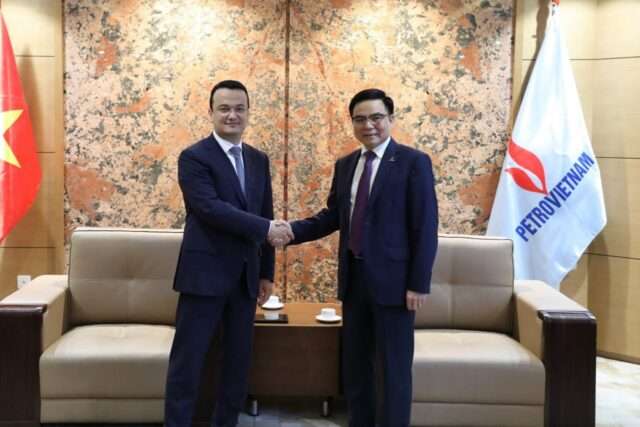
Geopolitical Report ISSN 2785-2598 Volume 28 Issue 4
Author: Guido Keller
Since Uzbekistan and Vietnam are expanding their economic cooperation and relations, Tashkent might promote its role in Central Asia as a regional interconnector. At the same time, Hanoi might support its foreign policy by establishing a strategic partnership with international and regional actors.
- Uzbekistan and Vietnam’s cooperation in different fields reflects Hanoi and Tashkent’s foreign policy based on establishing a strategic partnership with different international and regional actors.
- Since Uzbekistan’s strategic role in Central Asia, Vietnam might exploit Uzbek natural resources and territory to increase Vietnamese companies’ performance and presence in Central Asia.
- As an ASEAN member and due to its position in the Indo-Pacific region, Vietnam might offer Uzbekistan an attractive market capable of supporting Uzbek companies’ presence in South-East Asia.
Background
On February 7th, 2023, the Minister of Investment, Industry and Trade of Uzbekistan, Laziz Kudratov, during his visit to Hanoi, met with the Minister of Planning and Investment of Vietnam, Nguyen Chi Dung, as well as the President of the Chamber of Commerce and Industry of Vietnam Pham Tan Cong, and the heads of ten Vietnamese leading companies and associations.[1]
During the meetings, the parties discussed prospects for expanding partnerships in business and investment. Laziz Kudatrov discussed with the Head of the Chamber of Commerce and Industry of Vietnam issues of strengthening contacts between the two countries business circles.
A round table was organised to allow negotiations between Uzbek and Vietnamese representatives of business circles. Heads of MTT, Vietnam National Textile and Garment Group, 1954 COMPANY, State Corporation PetroVietnam, Vietnam National Chemical Group Vinachem, attended the meeting. The negotiators exchanged views on developing cooperation in the electrical, chemical, textile and food industries and agriculture.
Vietnamese companies are actively cooperating with representatives of the Uzbek business community. In Uzbekistan, joint projects are being implemented in the above economic and industry sectors. Also, during the negotiations, the possibility of implementing projects in the oil and gas sector and exploration, fish farming and rice cultivation was considered.
Why does it matter?
Uzbekistan has a strategic geographical position in Central Asia because the Uzbek territory has direct access to the South Asian market. Considering that Uzbekistan has the largest population in the area and significant economic potential due to its natural resources, starting a business in the Uzbek territory might become profitable whether Tashkent would overcome some problems related to financial regulation and security.
Since the beginning of its presidency, Shavkat Mirziyoyev has promoted a foreign policy to establish mutually beneficial cooperative relations with many countries of the world, including its closest neighbours, as well as with Russia and China. In addition, Uzbekistan actively participates in the work of the Commonwealth of Independent States and the Shanghai Cooperation Organization.
Therefore, improving relations with Vietnam might support Tashkent’s strategy of expanding trade cooperation and reaching new strategic markets. Indeed, Vietnam has emerged as a rising power in the Indo-Pacific region as an ASEAN member that bases its foreign policy on friendship and cooperation with different regional and international players.
Indeed, Hanoi is a reliable US partner in the Indo-Pacific region and has also established strategic partnerships with Japan, China, India, Russia and other countries.
In 2022, Vietnam’s economy grew faster, surpassing countries such as India, the Philippines, Indonesia, Australia, Taiwan and China. By contrast, although the Asia Development Bank forecasted Vietnam’s 2023 growth to be 6.3%, in December 2022, Vietnamese exports declined 14% from a year ago, consumer prices grew at 4.55%, and core inflation climbed faster by 4.99%.[2]
Considering that experts underlined that the country would face consumer price increases, with inflation forecast at about 5% in early 2023, Hanoi Government should counter these negative economic trends by attracting investments, stimulating the local market, and expanding partnerships with strategic countries such as Uzbekistan.
Indeed, the Uzbek territory might allow Vietnamese companies to exploit local natural resources and reach neighbouring South and Central Asia countries. Since both countries are attempting to stimulate their economy and face economic hardness coming from the pandemic, the current changing geopolitical scenario characterised by the West – Russia[3] confrontation and the United States – China competition in the Asia-Pacific,[4] their cooperation might offer both parties possibilities in different fields.
Uzbek-Vietnamese cooperation also confirms the interests that Central Asian and South-East Asian countries have to increase their cooperation and exploit their strategic position to promote their economy and navigate the current changing geopolitical scenario. If both regions would overcome local problems related to security, stability, and living standard conditions, their connection might create a common market capable of attracting foreign investments.
Sources
[1] MINISTERSTVO INVESTICIJ, PROMYSHLENNOSTI I TORGOVLI RESPUBLIKI UZBEKISTAN (2023) Uzbekistan i V’etnam rasshirjajut granicy investicionnogo sotrudnichestva. Link: https://miit.uz/ru/news/uzbekistan-i-vetnam-rasshirjajut-granitsy-investitsionnogo-sotrudnichestva.
[2] NGUYEN DIEU TU UYEN (2022) Vietnam Pulls Off Asia’s Fastest Growth as Economy Powers On, Bloomberg. Link: https://www.bloomberg.com/news/articles/2022-12-29/vietnam-economy-expands-faster-than-expected-in-december-quarter.
[3] ANTONIO GRACEFFO (2023) Russia’s economy since the beginning of the Ukraine conflict: sanctions are taking their toll, Geopolitical Report ISSN 2785-2598 Volume 27 Issue 3. Link: https://www.specialeurasia.com/2023/01/17/russia-economy-ukraine-sanctions/; ALEXEY SINELSHIKOV (2022) The Russian-Ukrainian conflict and its impact on food and regional security, Geopolitical Report ISSN 2785-2598 Volume 17 Issue 7. Link: https://www.specialeurasia.com/2022/03/25/ukrine-conflict-food-crisis/; SILVIA BOLTUC (2022) Geopolitical scenarios of the Persian Gulf in the aftermath of the Ukrainian crisis, Geopolitical Report ISSN 2785-2598 Volume 17 Issue 6. Link: https://www.specialeurasia.com/2022/03/21/persian-gulf-geopolitics/.
[4] RICCARDO ROSSI (2022) Joe Biden-ASEAN summit: a U.S. soft power action?, Geopolitical Report ISSN 2785-2598 Volume 19 Issue 14. Link: https://www.specialeurasia.com/2022/05/23/united-states-asean-biden/; RICCARDO ROSSI (2021) Geostrategy and military competition in the Pacific, Geopolitical Report ISSN 2785-2598 Volume 10 Issue 1. Link: https://www.specialeurasia.com/2021/08/06/geostrategy-pacific-competition/.
